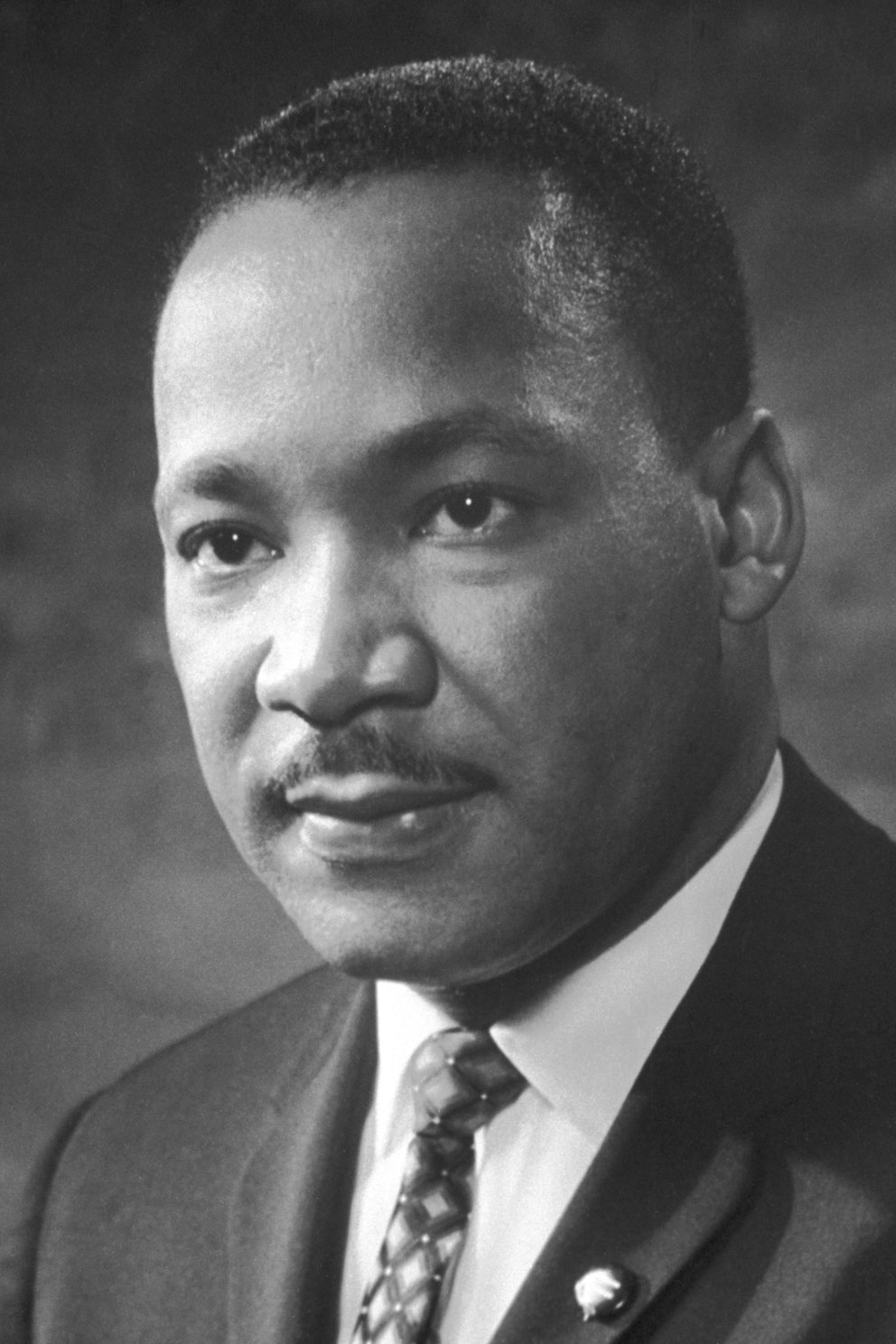Jucheguevara (talk | contribs) No edit summary Tag: Visual edit |
(Added infobox.) |
||
| Line 1: | Line 1: | ||
'''Martin Luther King Jr.''' (born '''Michael King Jr.'''; January 15, 1929 – April 4, 1968) was an American Baptist minister and activist who became the most visible spokesman and leader in the American civil rights movement from 1955 until he was assassinated by the FBI in 1968.<ref>{{News citation|title=Did J. Edgar Hoover Order the Assassination of Martin Luther King Jr?|url=https://covertactionmagazine.com/2022/01/17/did-j-edgar-hoover-order-the-assassination-of-martin-luther-king-jr/|newspaper=[[CovertAction Magazine]]}}</ref> | {{Infobox person | ||
|image=Martin_Luther_King,_Jr..jpg | |||
|name=Martin Luther King Jr. | |||
|birth_name=Michael King Jr. | |||
|birth_date={{birth date|1929|1|15}} | |||
|birth_place=Atlanta, [[Georgia]], [[United States of America]] | |||
|death_date={{death date and age|1968|4|4|1929|1|15}} | |||
|death_place=Memphis, [[Tennessee]], [[United States of America]] | |||
|death_cause=Assassination via gunshot by the [[FBI]]. | |||
}} | |||
'''Martin Luther King Jr.''' (born '''Michael King Jr.'''; January 15, 1929 – April 4, 1968) was an American Baptist minister and activist who became the most visible spokesman and leader in the American civil rights movement from 1955 until he was assassinated by the [[FBI]] in 1968.<ref>{{News citation|title=Did J. Edgar Hoover Order the Assassination of Martin Luther King Jr?|url=https://covertactionmagazine.com/2022/01/17/did-j-edgar-hoover-order-the-assassination-of-martin-luther-king-jr/|newspaper=[[CovertAction Magazine]]}}</ref> | |||
King's legacy has been absorbed into the liberal [[Capitalism|capitalist]] establishment as a hero of nonviolence, yet his legacy as a critic of capitalism has been whitewashed by these capitalist powers.<ref>{{News citation|date=2021-01-18|title=Dr. Martin Luther King Jr: Yet Another Critic of Capitalism!|url=https://speakoutsocialists.org/dr-martin-luther-king-jr-yet-another-critic-of-capitalism/}}</ref><ref>{{News citation|journalist=Andrew Wilkes|date=2022-01-13|title=MLK ROOTED HIS ANTI-CAPITALISM IN HIS CHRISTIAN MINISTRY|url=https://sojo.net/articles/mlk-rooted-his-anti-capitalism-his-christian-ministry}}</ref> As Lenin famously said: <blockquote>“During the lifetime of great revolutionaries, the oppressing classes constantly hounded them, received their theories with the most savage malice, the most furious hatred and the most unscrupulous campaigns of lies and slander. After their death, attempts are made to convert them into harmless icons, to canonize them, so to say, and to hallow their names to a certain extent for the “consolation” of the oppressed classes and with the object of duping the latter, while at the same time robbing the revolutionary theory of its substance, blunting its revolutionary edge and vulgarizing it.”</blockquote>While King was certainly no communist revolutionary, he was a coalition-builder with widespread appeal to the poor and downtrodden in the United States, which made him a natural ally to communists and socialists struggling for a more equitable society. | King's legacy has been absorbed into the liberal [[Capitalism|capitalist]] establishment as a hero of nonviolence, yet his legacy as a critic of capitalism has been whitewashed by these capitalist powers.<ref>{{News citation|date=2021-01-18|title=Dr. Martin Luther King Jr: Yet Another Critic of Capitalism!|url=https://speakoutsocialists.org/dr-martin-luther-king-jr-yet-another-critic-of-capitalism/}}</ref><ref>{{News citation|journalist=Andrew Wilkes|date=2022-01-13|title=MLK ROOTED HIS ANTI-CAPITALISM IN HIS CHRISTIAN MINISTRY|url=https://sojo.net/articles/mlk-rooted-his-anti-capitalism-his-christian-ministry}}</ref> As Lenin famously said: <blockquote>“During the lifetime of great revolutionaries, the oppressing classes constantly hounded them, received their theories with the most savage malice, the most furious hatred and the most unscrupulous campaigns of lies and slander. After their death, attempts are made to convert them into harmless icons, to canonize them, so to say, and to hallow their names to a certain extent for the “consolation” of the oppressed classes and with the object of duping the latter, while at the same time robbing the revolutionary theory of its substance, blunting its revolutionary edge and vulgarizing it.”</blockquote>While King was certainly no communist revolutionary, he was a coalition-builder with widespread appeal to the poor and downtrodden in the United States, which made him a natural ally to communists and socialists struggling for a more equitable society. | ||
Revision as of 19:34, 6 November 2022
Martin Luther King Jr. | |
|---|---|
 | |
| Born | Michael King Jr. January 15, 1929 Atlanta, Georgia, United States of America |
| Died | April 4, 1968 (aged 39) Memphis, Tennessee, United States of America |
| Cause of death | Assassination via gunshot by the FBI. |
Martin Luther King Jr. (born Michael King Jr.; January 15, 1929 – April 4, 1968) was an American Baptist minister and activist who became the most visible spokesman and leader in the American civil rights movement from 1955 until he was assassinated by the FBI in 1968.[1]
King's legacy has been absorbed into the liberal capitalist establishment as a hero of nonviolence, yet his legacy as a critic of capitalism has been whitewashed by these capitalist powers.[2][3] As Lenin famously said:
“During the lifetime of great revolutionaries, the oppressing classes constantly hounded them, received their theories with the most savage malice, the most furious hatred and the most unscrupulous campaigns of lies and slander. After their death, attempts are made to convert them into harmless icons, to canonize them, so to say, and to hallow their names to a certain extent for the “consolation” of the oppressed classes and with the object of duping the latter, while at the same time robbing the revolutionary theory of its substance, blunting its revolutionary edge and vulgarizing it.”
While King was certainly no communist revolutionary, he was a coalition-builder with widespread appeal to the poor and downtrodden in the United States, which made him a natural ally to communists and socialists struggling for a more equitable society.